'Seeking the light' In a violent and troubled world, Quakers search for peaceful solutions
- Oops!Something went wrong.Please try again later.
DELAND — Mixed in with the African American history displays and Black empowerment nonprofits at DeLand's Juneteenth celebration this summer was a group most wouldn't expect to see at an event that commemorates the 1860s emancipation of enslaved people in the United States.
Huddled together at Earl Brown Park was a small gathering of local Quakers decked out in their matching bright blue T-shirts.
They were there to give away nearly 500 books that wouldn't last long in Florida schools amid the state's anti-woke battles, persistent book bans, "Don't Say Gay" law and shunning of critical race theory.
Most of the books centered on Black, Hispanic, Native American and LGBTQ issues, and have been banned in some Florida schools.
The books were donated by frustrated Volusia County teachers as well as people in other states who see Florida's Parental Rights in Education Act as permission to ban books.
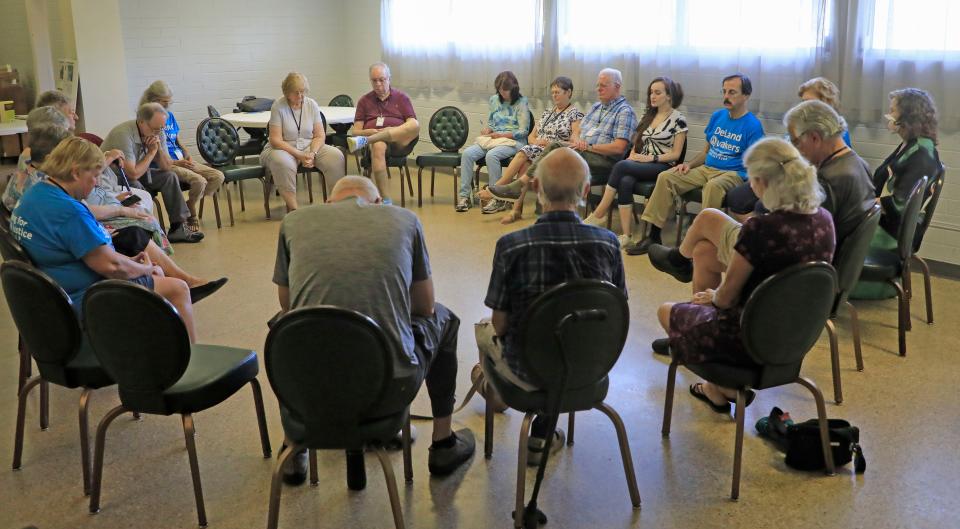
That Quakers were the ones boldly handing out books that have disappeared from Florida classrooms and school library shelves might seem odd for members of an off-the-radar religion who quietly help people in need and worship in small groups gathered in nondescript meeting halls.
But the book giveaway is a continuation of a nearly 400-year-old tradition among Quakers to fight for equality and freedom to make personal choices. Quakers don't seek the spotlight, but they've never been afraid to speak truth to power.
From the time Quakers emigrated from England to the American colonies in the 1660s to escape persecution for their religious beliefs, they were pioneers in social reform. They befriended Native Americans, protested slavery starting in the late 1600s, and offered their homes as safe houses within the 1800s Underground Railroad.
Quaker Susan B. Anthony fought throughout the 19th century for the equal rights of both Blacks and women, and she became a general in the battle to allow women to vote.
Since the 1950s, Quakers have publicly denounced nuclear weapons. Quaker Bayard Rustin organized the March on Washington in 1963.
What do Quakers believe?
Quakers gather in places that are the polar opposite of the choreography, mass assembly, decibel level and flash of a megachurch. Their meeting spots also bear no resemblance to traditional churches packed with holy statues, crosses, candles, chandeliers, organs and frescos all encircled in colorful stained glass windows.
Quakers see all those things as distractions and barriers to an unhampered connection to a higher power.
Many Quakers, who also refer to themselves as the Religious Society of Friends, meet in large rooms with rows and rows of wooden benches, and not much else. Usually, there is no altar. Others gather in spartan community center meeting rooms with nothing more than folding chairs arranged in a circle to connect and put everyone at equal status.
Their meeting spaces, practices and beliefs are stripped-down versions of most Christian traditions. There is no hierarchy or universal doctrine similar to other religions.
Quakerism was founded in the 1650s in England to break free of the complexity of the state church.
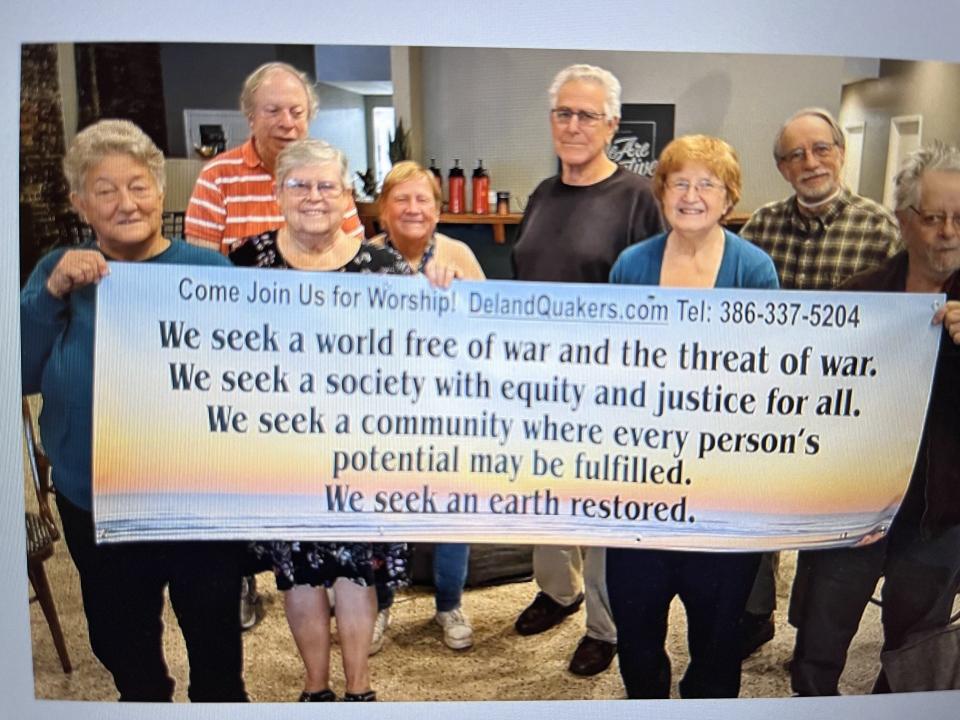
Quakerism encompasses a wide spectrum of beliefs, with different sets of practices within the religion. Some consider themselves Christian, and some do not.
Some believe in heaven and hell, others don't. Some believe in reincarnation. Some believe their spirit joins the universe after they die.
"For many Quakers, it's not about Jesus being God," said Jon Kershner, a Quaker who has master's and doctorate degrees in divinity and theology from Princeton Theological Seminary and the University of Birmingham in England. "Some liberal Quakers don't believe in God, but they do believe in the divine. It's more inward. It's not an authoritarian institution."
Some adhere to multiple faiths. There are Buddhist, Pagan, Islamic and Catholic Quakers.
There have been Quaker schisms for many years, and some groups don't recognize other Quakers as legitimate, said Kershner, who's a religious studies professor at Pacific Lutheran University in Tacoma, Washington.
"There have been four or five splits among Quakers within the last 10-15 years," said the 45-year-old Kershner, who was a practicing Baptist in his younger years.
'A continual search for divine answers'
The Religious Society of Friends has its roots in Christianity, which is more visible among conservative Quakers who refer to their services as programmed.
Programmed Quaker meetings can be similar to other Protestant church services with presiding ministers, hymn singing, led vocal prayer, scripture readings and sermons.
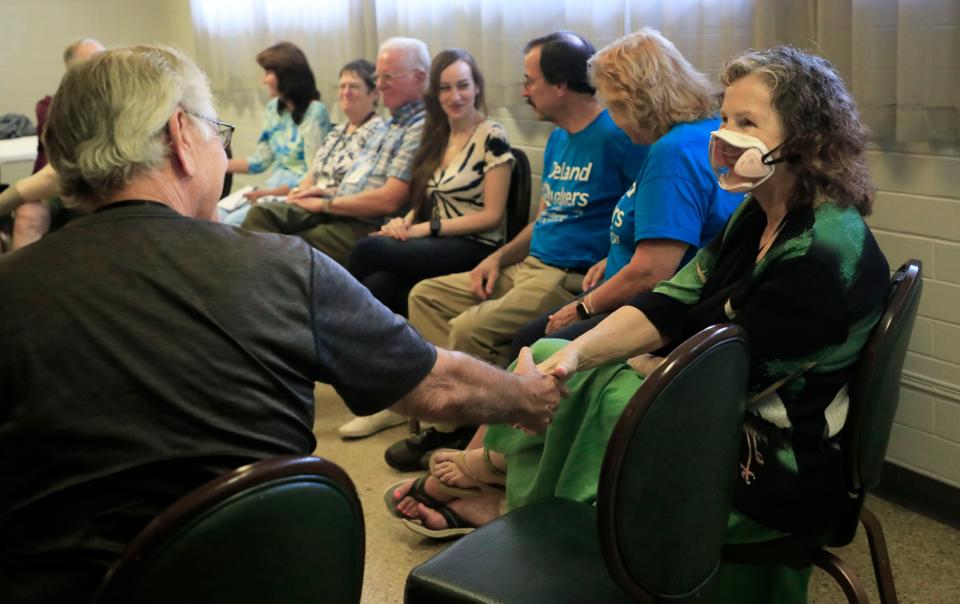
Quakers have never celebrated the Holy Eucharist or any sacraments because they believe ritual distracts and takes focus away from God.
About one-third of Quakers in the United States are unprogrammed. Unprogrammed Quaker meetings have no leaders or ministers. They say there is no need for clergy because everyone has "the divine" in them, and everyone should be equal.
Unprogrammed meetings also have no music, no organized prayer, and no Bible reading. They sit in silence, listening and waiting for what God, the "inner light," or the divine might have to tell them.
They call it "waiting worship" or "seeking the light." They try to clear all thoughts from their mind, and then they listen for guidance on how to live, how to help others and what to focus on.
They believe each person can receive that communication directly with no need for interpretation from another. Most say the message comes to them in a compelling thought, not an actual voice, and they pause to contemplate whether it's a message from the divine, and whether it's meant to be shared.
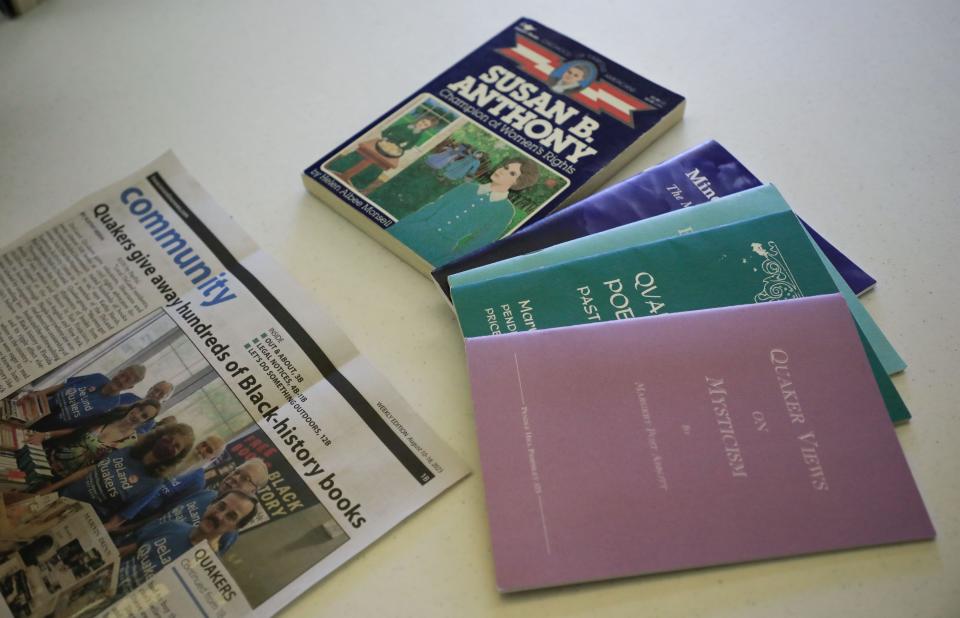
For atheists, Quakerism is more of a way of life than a set of beliefs.
Most Quakers believe in simplicity, peace, nonviolence, integrity, community, consensus decision-making, equality and stewardship.
"It can be hard to grasp," said Volusia County Quaker Kathy Hersh. "Quakers generally don't think we have all the answers. We're in a continual search for divine answers."
Only one Quaker group in Volusia County
There are about 400,000 Quakers in the world, and they're scattered across 87 countries, everywhere from Mexico to Kenya.
In 1700, when there were around 250,000 Europeans in North America, about 55,000 of them were Quakers. Today there are roughly 334 million people in the United States, about 75,000 of whom are Quakers.
Florida has about 1,000 Quakers scattered across the state. Around 200 of them get together once a year for an annual meeting, but the local groups maintain autonomy.
The Quakers who gave away books at the DeLand Juneteenth celebration are part of the only organized Religious Society of Friends group in Volusia County.
There are only 16 members, but they make an impact on the area. They're part of the FAITH group, which is made up of 30 diverse Volusia County religious congregations that work together on social justice efforts.
The local Quakers also give free food, clothing and toiletries to 25-30 homeless people on the streets in the DeLand area once a month. They also serve home-cooked meals to homeless people staying at The Neighborhood Center of West Volusia.
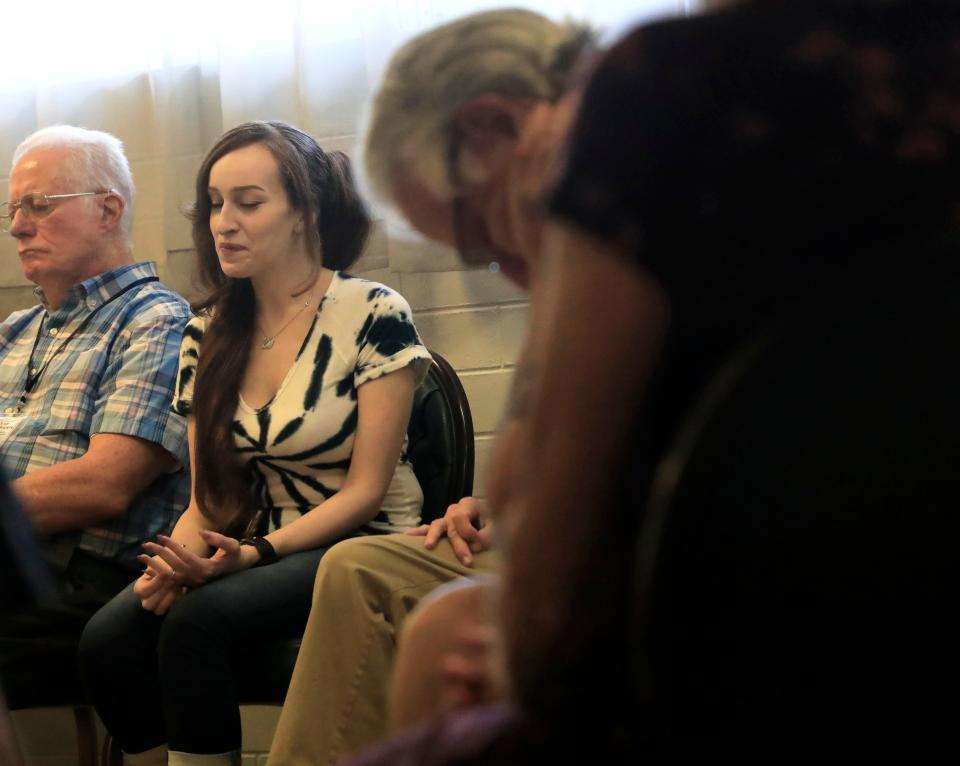
Group member Heba Ismail conceived the idea for the Volusia Quakers to help the homeless on the streets of DeLand. Ismail is a lifelong Muslim, but said she was fully welcomed into the group last year.
"I was fascinated how peaceful, open and loving these people were," the 28-year-old Palm Coast resident said. "Our group is so open to the divine love in one another. Every person has God's light. Our similarities and differences don't change that. I believe it's the same God for all of us."
She said Quakers and Muslims work toward "exactly the same things."
Ismail was born in Dubai and lived the first 17 years of her life there. She lived in Egypt for seven years after that and became a licensed doctor there.
'Helping others is not political'
While some may question if Quakers mix politics and religion, followers of the faith say they're focused on doing the right thing - not politics.
"Helping others is not political, it is human," said Carol Reed, who grew up in a deeply rooted Quaker community in Pennsylvania. "It's about humanity, decency and equality - not politics."
Reed, who's a ninth-generation Quaker, said the founders of her religion were adamantly opposed to state-sponsored religion. They wanted to put a stop to kings and churches ganging up on peasants, as happened in England.
"They believed individual freedom of choice is sacrosanct," Reed said. "Freedom to choose your religion, your job, your partner, what books to read, your childbearing - or not. That is not the business of governing. That is why the Quakers wanted separation of church and state to be codified."
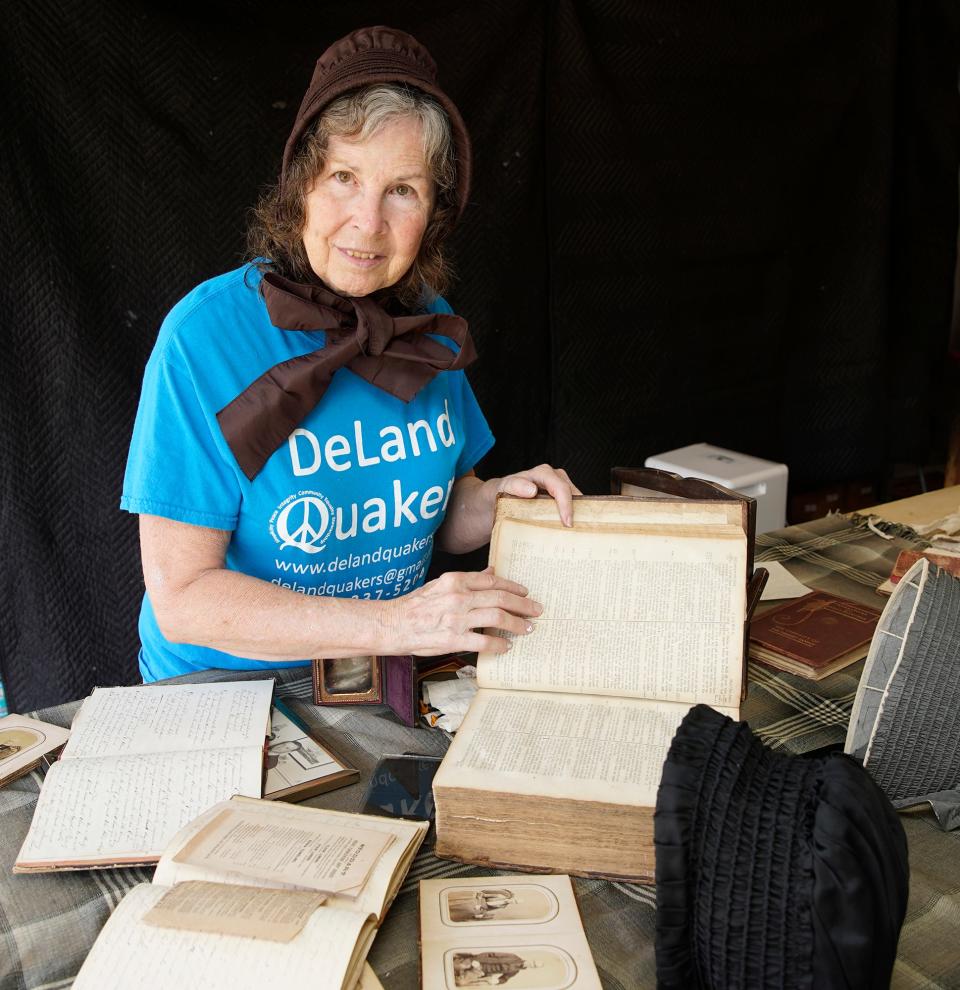
She said those arguing for anti-wokeness are "trying to muddy this issue in order to discriminate punitively."
"Using your religion as a weapon to infringe on the rights of a group because of any reason, that is immoral and should never happen," she said.
The political and religious entanglement
Jim Cain, another Volusia County Quaker, said it can be hard to steer clear of politics while living out your beliefs.
"I definitely believe in the separation of church and state in that I would hate to see any religious group try and impose its religious beliefs on the populace as the Taliban has done or as the government in Iran has done," said Cain, who lives in DeLand. "However, I think religions always have a set of values, and it is natural to want government policies to reflect these values."
Because Quakers are passionate about nonviolence, equality, and respecting every person, he said you'll find many Quakers involved in the political process on a variety of issues: Defense spending, criminal justice reform, capital punishment, immigration, women's rights and education.
Quakers have a national lobbying organization known as the Friends Committee on National Legislation. Quakers also tend to be active in local political matters, Cain said.
The social justice aspect of Quakerism is part of what drew Cain to the faith.
In 1971, he had just finished college at Georgia State University and was poised to be drafted to fight in the Vietnam War. He didn't want to become part of the protracted war, and he was feeling upset about it one afternoon when he went to an Atlanta park for a concert.
There in Piedmont Park, he saw Quakers protesting the war and discussing environmental and criminal justice issues. He also saw a Quaker offering draft counseling to young men distraught over the thought of going to Vietnam.
Cain had already applied for conscientious objector status, and the Quaker man helped him navigate what would come next.
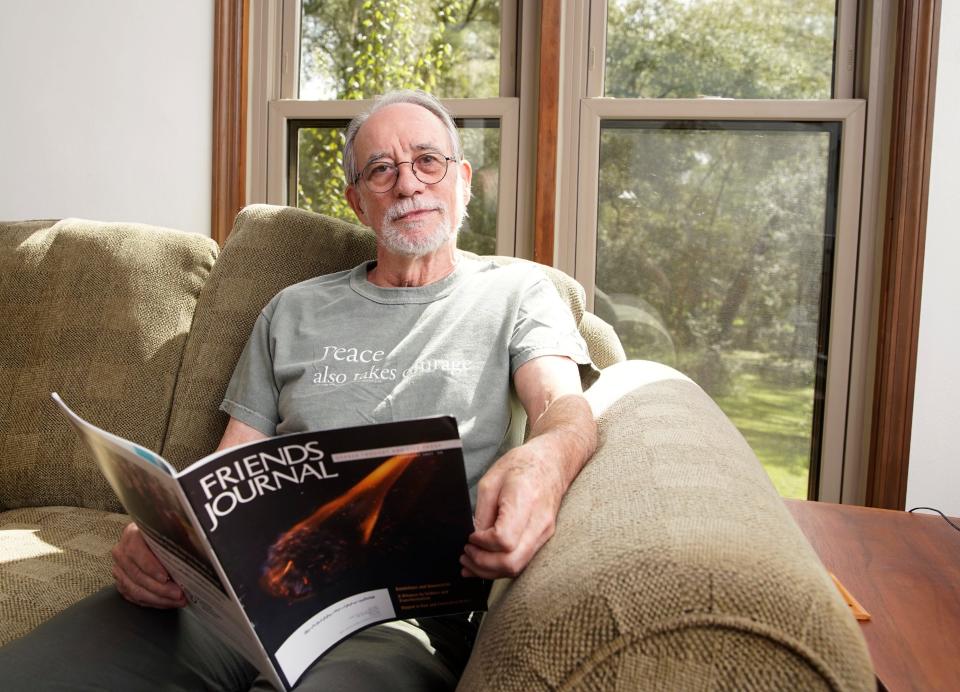
Cain was raised as a Southern Baptist, but by his teens, he no longer held fundamental Christian beliefs and he stopped going to church.
The 73-year-old still doesn't believe there is a God who "will be personally concerned about me and judge me at death."
"Quakers are more concerned about what happens to you when you're alive than when you're dead," said Cain, who until his retirement helped determine if people with serious mental illness were competent to stand trial.
"What you do is more important than orthodoxy," he said. "Quakers are on the same page as seekers, all searching for the right way to live our lives and make the world a better place."
'We'll listen for the spirit'
The local Quakers hold an unprogrammed meeting every Sunday morning at The Garden Club of DeLand, a small community center building located on the southern edge of a large park.
They have the Garden Club building to themselves from 10 a.m. to noon, and they chat, drink coffee, and get a bite to eat for 30 minutes before they begin their service.
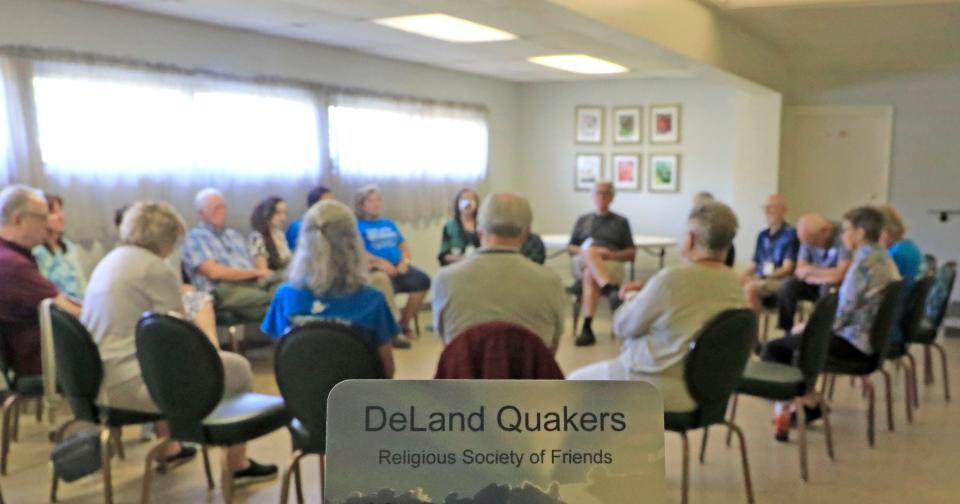
At 10:30 a.m., everyone takes a seat in one of the chairs arranged in a circle. On a hot August morning this summer, there were 18 people and one well-behaved dog named Sunflower in the circle. It's a group of mostly middle-aged and senior citizen members.
A man in the group explained the "worshipful waiting" that was about to begin.
"We'll listen for the spirit," he said.
"That presence we're seeking is a loving, all-inclusive presence filled with light," a woman added.
No one formally began the service, but within just a few minutes of sitting down, everyone stopped talking.
The only thing breaking the silence was the whir of the air conditioner and the buzz of cicadas in the tall trees of the park.
Some people closed their eyes, others stared at the floor.

A calm filled the room as the Quakers drifted into prayerful listening in their sacred space.
About five or 10 minutes passed before the first person spoke.
"If you sit quietly and silently at the base of a tree, wildlife will come to you," the man said.
About 20 minutes passed, and then the same man as well as a few other people shared their thoughts. Hersh said she'd been contemplating how deeply divided people have become.
"Genetics, experiences and different wiring," Hersh said. "Perhaps that's what this is all about. It leads me to think more compassionately about people."
The room fell silent again, and the call of crows outside could be heard.
A while later, Ismail said she was excited about giving away packages of essentials to the homeless that afternoon.
"Every goodness has a ripple effect," Ismail said. "The goodness doesn't stop when the action ends."
They closed with "holding in the light" the people of Maui, a woman whose daughter was dying in hospice and homeless people.
Local women's Quaker roots reach back to 1682
The DeLand-area group of Quakers is small, but it's full of interesting people. Many of them were raised with other religions - everything from Catholicism to Judaism to Islam - and chose Quakerism at some point.
Some are still Christians but have added Quaker beliefs and practices to their lives.
Reed is one of five lifelong Quakers in the group, and she has some of the deepest roots in the religion. The Deltona woman's ancestors came from England and Wales in 1682 to escape persecution for being Quakers.
Her family formed the first Quaker community in the American colonies in what is now Pennsylvania.
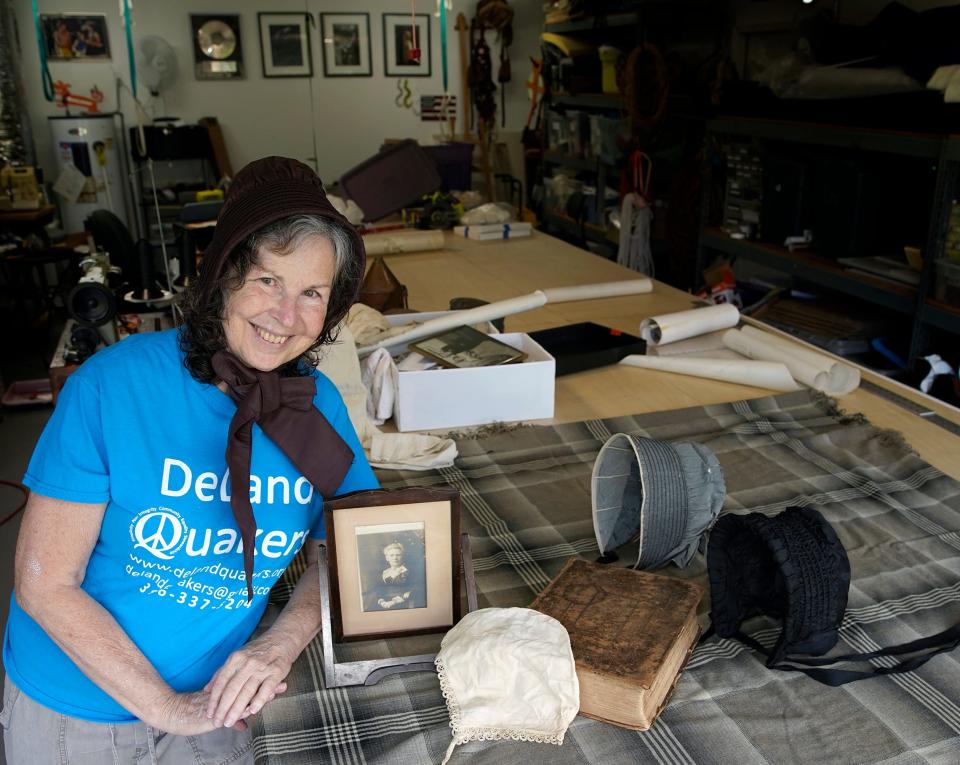
Reed is descended from Tudor kings, and she's also related to Susan B. Anthony, the well-known suffragist.
"She babysat my grandmother," Reed said.
The 73-year-old Reed was raised with traditional Quaker customs, and that included wearing very conservative clothing.
"We all looked like 'Little House on the Prairie,' " Reed said. "Very plain, drab brown and gray clothing. Up through the 1950s, older women wore bonnets and men wore flat hats."
The simplicity was a rebellion against the excesses of English royalty, and an effort to focus more on God and less on self.
She was taught to say thee and thou. Anything flashy was suspect.
"My cousin's boyfriend had chrome on his car, which meant he was up to no good," she said.
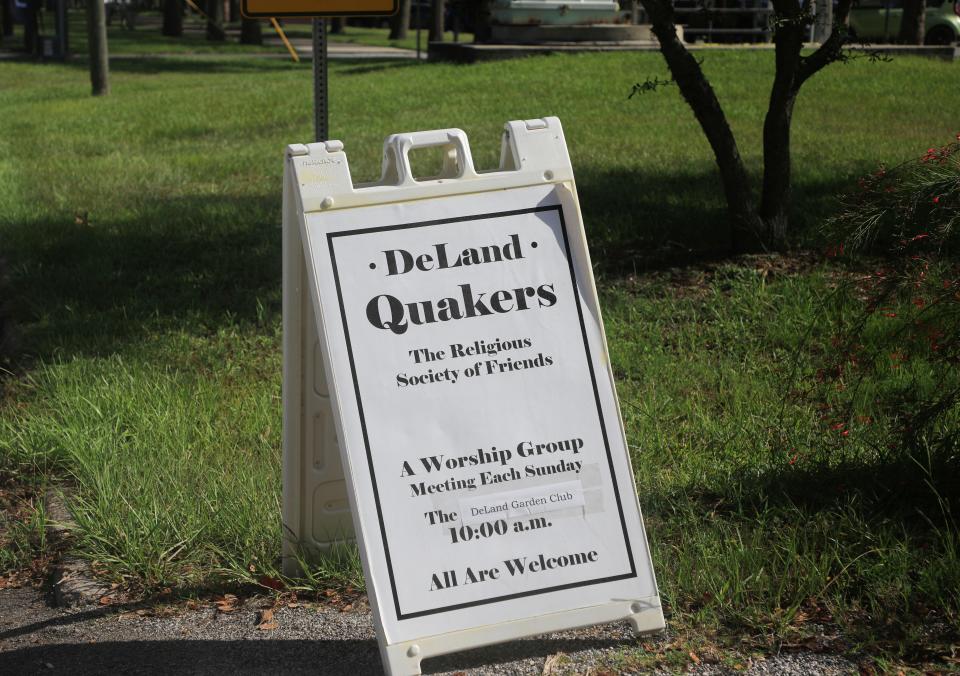
Reed's mother banned televisions, stereos and record players under her roof, and had a strong objection to Elvis Presley's songs. Going to the movies was forbidden.
The way Reed grew up was referred to as "plain." After high school, though, she took a sharp, radical turn toward the modern way of life.
She went to college, and then she wound up sewing costumes, handling lighting, making scenery, and designing dressing rooms for Van Morrison, Jackson Brown, Keith Richards, Bruce Springsteen and others in bands including Queen, the Eagles and Pink Floyd.
In more recent years, she has been involved in Cirque du Soleil shows.
'I wanted to work for peace'
The 74-year-old Hersh is semi-retired now, but for more than 30 years she was a freelance journalist. In the 1970s, she was an ABC correspondent in Mexico and Central America and she covered unrest, coups, civil war, earthquakes and an oil boom.
"It was seeing and smelling war that led me to the Quakers," she said. "I saw it didn't lead to anything. It was horror."
She has a refrigerator magnet now that says "War is terrorism with a bigger budget."
"I wanted to work for peace," Hersh said.
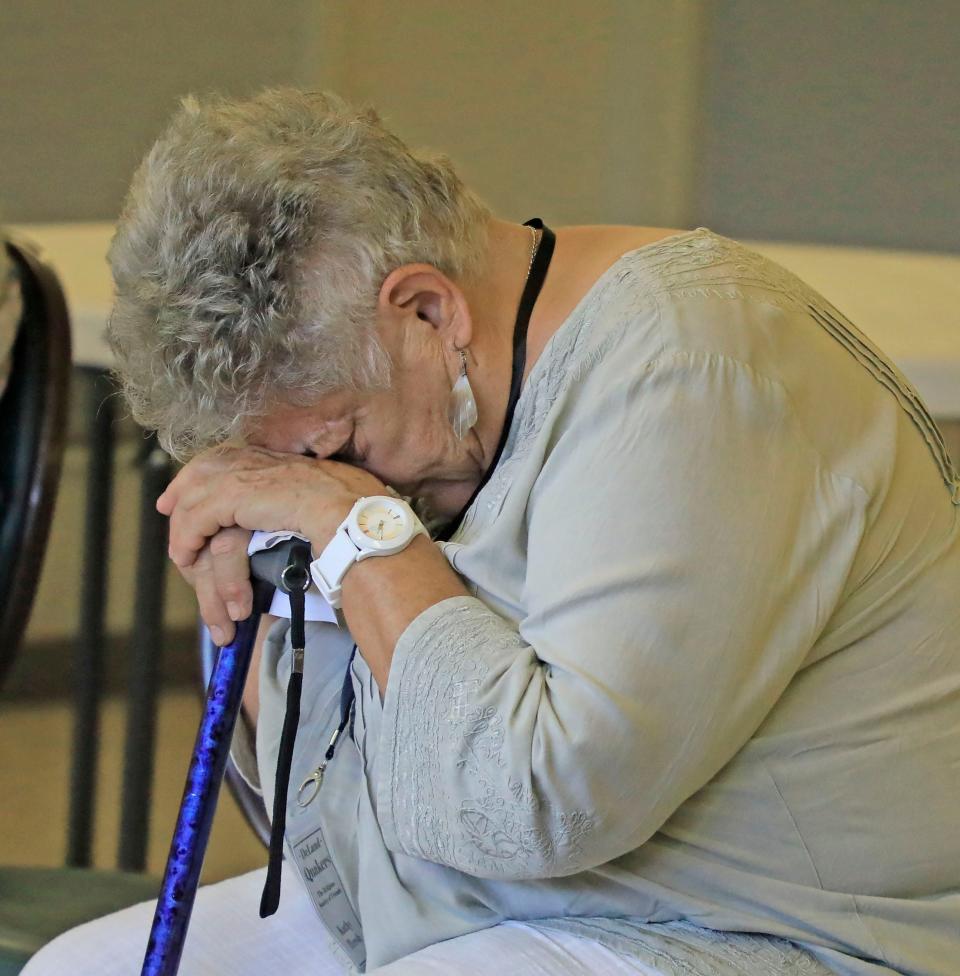
Hersh started crossing paths with Quakers when she got involved in migrant and farm issues and did advocacy work for Central American refugees. She produced a documentary that aired on PBS and focused on an underground railroad for those fleeing Central America and heading to the United States.
In the midst of that work, she met people in faith communities involved in the desperate migration. A friend suggested she work with Quakers since she understood Central American issues and spoke Spanish.
"I had seen the reasons people were leaving and seeking asylum," Hersh said. "I felt an obligation as someone who had witnessed the atrocities."
She started attending a Miami meeting of Quakers for her work, and in the 1980s she said it "became my spiritual home."
Hersh was raised as a Methodist, and she still believes there's "a higher power, a creator." But she now feels like Christianity was "imposed by people with something to gain."
Hersh feels the same divine presence sitting in a circle with Quakers that some experience in a church during a service.
"There's a power in that circle," she said. "There are meetings when you just want to stay there because it's so peaceful."
'The Quaker way of life'
The local Quakers weren't looking for attention when they decided to give away books over the summer, and again on Oct. 7 at a downtown DeLand business, Hersh said.
"We had been increasingly distressed by the 'Don't Say Gay' law, and the DeSantis administration trying to almost make Black history irrelevant to American history," Hersh said. "We thought, what can we do?"
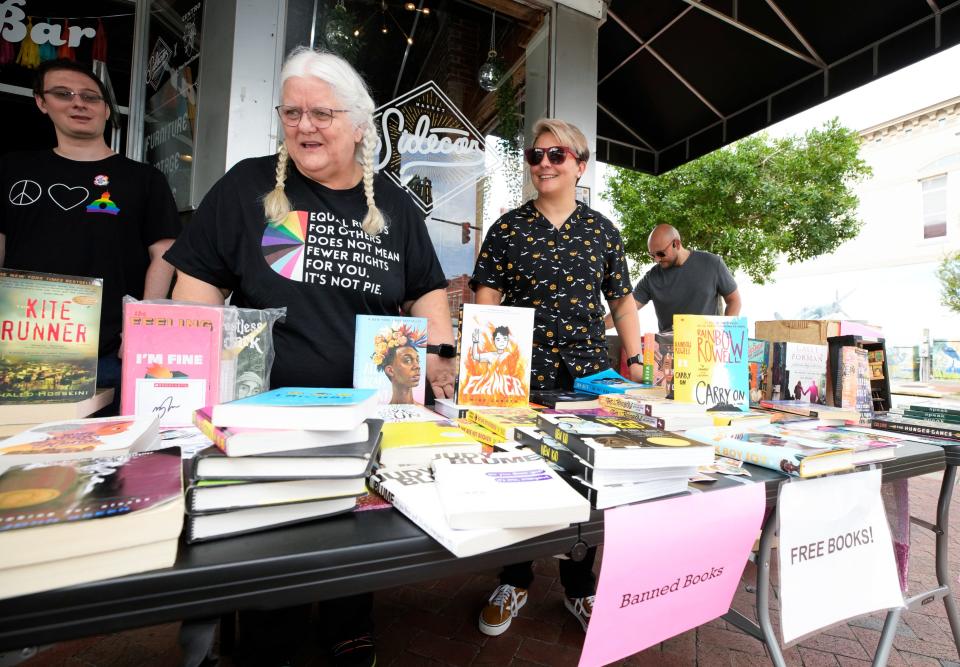
She started paying attention to the books being sold by teachers and a local library, and she and her fellow Quakers started scouring thrift shops. They also turned to social media to ask for book donations, and they received free books sent by the boxful from New York to San Francisco.
Hersh said giving away written works ranging from children's books on Harriet Tubman to books on the Tulsa massacre "was one of the most gratifying things I've ever been involved in. People were just so hungry for these books."
"We feel all people are equal, so how can we sit by and watch when a white supremacist is trying to diminish and erase parts of Black history?" Hersh said.
Over the years, the local Quakers have held workshops on racism and bullying, and they've been involved in everything from prison reform to helping the homeless.
Another less visible religious group: Daytona Muslims find more quiet prayer and family time during COVID-altered Ramadan
Hersh said there are a lot of people who don't know about Quakers - including the financial backing Quakers gave Martin Luther King, Jr., so he could go to India to study nonviolence - because they don't promote themselves.
"A lot of people think we died out, but people involved in social justice issues know about Quakers," Hersh said. "It's part of the Quaker way of life to be involved in issues we've been concerned about since the 1600s."
You can reach Eileen at Eileen.Zaffiro@news-jrnl.com
This article originally appeared on The Daytona Beach News-Journal: Banned book giveaways, homeless help are part of Quaker group mission

